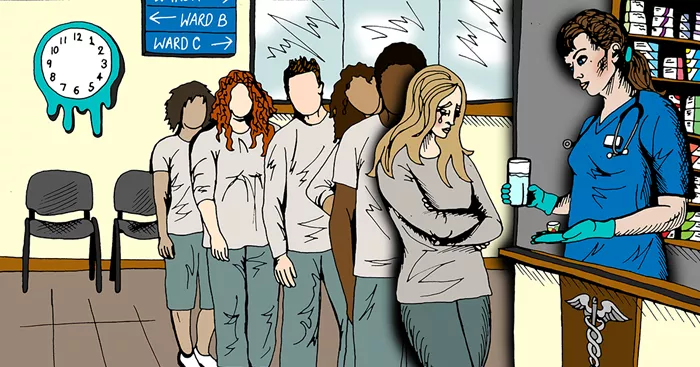Sectioning, also known as involuntary commitment, is a process that allows individuals with severe mental health issues to be detained and treated in a psychiatric facility without their consent. This action is taken when the person poses a significant risk to themselves or others and is unable or unwilling to seek help voluntarily. This article explores the legal frameworks, criteria, roles of mental health professionals and legal authorities, types of sections, ethical considerations, and the impact on individuals and families involved in sectioning.
Legal Framework and Criteria for Sectioning
Legal Definitions and Legislation
The process and criteria for sectioning vary by country. For example, in the UK, the Mental Health Act 1983 (amended in 2007) outlines the conditions under which a person can be sectioned. In the US, individual states have their own laws, but generally focus on the safety and well-being of the individual and the public.
Criteria for Sectioning
To be sectioned, an individual typically must:
Have a severe mental illness that impairs their ability to function.
Pose a risk to themselves or others.
Be unable to make informed decisions about their care.
The Process of Sectioning
The process involves assessments by mental health professionals and legal authorities. Usually, an assessment by one or more psychiatrists, along with a second opinion from another healthcare professional, is required. Court hearings may also be involved to ensure the individual’s rights are protected.
Roles of Mental Health Professionals and Legal Authorities
Psychiatrists and Mental Health Teams
Psychiatrists assess the individual’s mental state and determine whether the criteria for sectioning are met. Mental health teams support the assessment process and provide ongoing care.
Legal Authorities
Legal authorities, such as judges or magistrates, authorize sectioning and ensure it complies with legal standards. Applications for sectioning might require court approval, which involves examining evidence and hearing from mental health professionals and the individual.
Advocates and Legal Representatives
Individuals being considered for sectioning are often provided with advocates or legal representatives to ensure their rights are protected. These advocates help the individual understand the process and represent their interests.
Types of Sections and Their Implications
Emergency Detention
Emergency detention allows for quick action when there is an immediate risk. This type of sectioning is usually short-term, lasting from 24 hours to several days.
Short-Term and Long-Term Detention
Short-term detention typically lasts a few weeks for initial treatment and stabilization. Long-term detention can last several months and is used when ongoing treatment is necessary. Regular reviews ensure that continued detention is justified.
Community Treatment Orders (CTOs)
CTOs allow for compulsory treatment while the individual remains in the community, balancing necessary treatment with the individual’s freedom.
Ethical Considerations and Human Rights
Balancing Safety and Autonomy
Sectioning involves overriding the individual’s consent, raising ethical questions about personal freedom and autonomy. The goal is to protect individuals and those around them while ensuring the decision is made with the individual’s best interests in mind.
Ensuring Informed Consent
While informed consent is crucial in medical ethics, individuals who are sectioned are deemed incapable of making informed decisions. Rigorous safeguards are necessary to protect their rights.
The Role of Advocacy
Advocates ensure that individuals understand their rights and the reasons for their detention, providing a voice in legal and medical proceedings.
Human Rights Legislation
International human rights laws emphasize the need for voluntary treatment and the least restrictive alternatives, protecting the dignity and rights of individuals.
Impact on Individuals and Families
Emotional and Psychological Effects
Being sectioned can be distressing, leading to feelings of loss of freedom and stigma. Compassionate care and support are crucial to help individuals cope.
Family and Caregiver Involvement
Families may experience guilt and anxiety. Clear communication and support are essential to help them understand the process and support their loved one.
Long-Term Recovery and Reintegration
Post-discharge support, including follow-up care and therapy, is crucial for long-term recovery and reintegration into the community.
Alternatives to Sectioning
Voluntary Admission
Encouraging voluntary admission allows individuals to seek help on their own terms, leading to better engagement with treatment.
Crisis Intervention Services
Crisis intervention services provide immediate support, reducing the need for involuntary commitment.
Community-Based Support
Community-based services, such as outpatient treatment and peer support, help prevent crises and reduce the need for sectioning.
Improving the Sectioning Process
Training and Education for Professionals
Ongoing training for mental health professionals and legal authorities is essential for understanding mental health conditions and ethical considerations.
Enhancing Patient Rights and Protections
Strengthening rights and protections, including regular reviews and access to legal representation, is crucial.
Public Awareness and Stigma Reduction
Raising public awareness about mental health issues and the sectioning process can help reduce stigma and promote understanding.
Conclusion
Being sectioned for mental health is a complex and often distressing experience. Balancing safety, treatment, and respecting individual rights is crucial. Improving the sectioning process, enhancing support services, and promoting voluntary care options can better support individuals with severe mental health issues and help them achieve recovery and reintegration into society.
[inline_related_posts title=”You Might Be Interested In” title_align=”left” style=”list” number=”6″ align=”none” ids=”9628,9566,9563″ by=”categories” orderby=”rand” order=”DESC” hide_thumb=”no” thumb_right=”no” views=”no” date=”yes” grid_columns=”2″ post_type=”” tax=””]
































